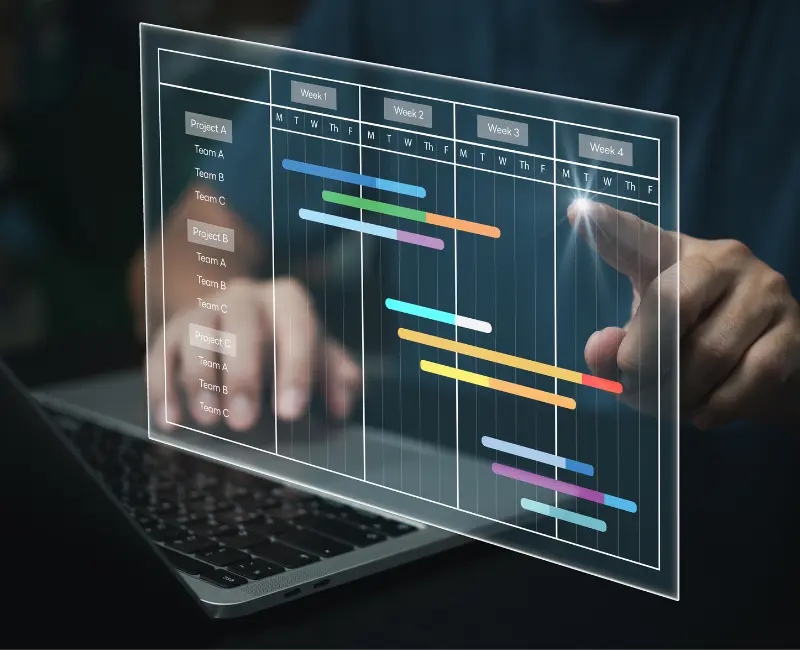Audit di Disruption dell’IA
Valutare i rischi di disruption legati all’IA e il suo impatto sul mercato
Supportare investitori e aziende nella valutazione del potenziale trasformativo dell’IA, nell’anticipazione dei rischi e nella definizione di strategie sostenibili.
Comprendere i rischi legati all’IA all’interno del proprio portafoglio
La rapida evoluzione dell’IA rappresenta sia un’opportunità che un rischio per gli investitori. L’audit di disruption dell’IA di Vaultinum consente ai Private Equity di anticipare le potenziali minacce derivanti da nuovi concorrenti tecnologici che sfruttano l’IA per sfidare le aziende presenti nel loro portafoglio.
Attraverso un’analisi approfondita dell’impatto dell’IA sull’industria di riferimento, sul posizionamento di mercato e sulla sostenibilità dei modelli di business, i nostri audit offrono agli investitori insight strategici per proteggere e ottimizzare i loro investimenti nel lungo termine.

Si fidano della nostra competenza
I nostri clienti
Converti i rischi dell’IA in un vantaggio strategico di lungo periodo
Il nostro approccio per valutare il potenziale disruptivo dell’IA
Una metodologia strutturata, basata sull’expertise di specialisti, per analizzare i rischi di disruption legati all’IA.
01
Analisi del settore e del mercato
02
Valutazione dell’azienda
03
Strategia di investimento futura
01
Analisi del settore e del mercato
- Valuta l’impatto dell’IA sul settore di riferimento dell’azienda
- Identifica i nuovi concorrenti emergenti che sfruttano l’IA
- Determina se l’IA rappresenta un fattore di disruption o un motore di crescita
- Analizza le tendenze di adozione dell’IA all’interno dell’industria
02
Valutazione dell’azienda
- Analizza l’integrazione dell’IA nella strategia aziendale
- Valuta la capacità dell’azienda di adattarsi alle trasformazioni di mercato guidate dall’IA
- Identifica le carenze nell’adozione dell’IA e nell’innovazione
- Misura il posizionamento competitivo dell’azienda in uno scenario futuro
03
Strategia di investimento futura
- Identifica le opportunità di investimento nell’IA
- Evidenzia le aree in cui l’IA può migliorare l’efficienza e favorire la crescita
- Valuta i rischi legati all’IA per garantire la sostenibilità del modello di business
- Fornisce raccomandazioni concrete per un’integrazione ottimale dell’IA
Investireste nella tecnologia alla cieca?
Alla Vaultinum, sappiamo che investire nella tecnologia comporta dei rischi. La nostra Tech Due Diligence aiuta gli investitori a osare con prudenza (Dare with care), a investire con determinazione mantenendo un controllo intelligente dei rischi.
Chi può beneficiare di un audit di disruption dell’IA?
I nostri audit offrono a investitori, dirigenti d’azienda e fondatori di startup una visione chiara delle trasformazioni di mercato generate dall’IA, identificando al contempo le opportunità strategiche da cogliere.
Vantaggi per i Private Equity
- Valutare le minacce legate all’IA per le aziende in portafoglio e anticipare la disruption
- Identificare i nuovi concorrenti che sfruttano l’IA e le evoluzioni del mercato
- Adattare e mettere in sicurezza i modelli di business di fronte alle trasformazioni indotte dall’IA
- Ottenere raccomandazioni concrete per massimizzare la creazione di valore attraverso l’IA
Vantaggi per le aziende
- Confrontare il proprio livello di adozione dell’IA con quello dei concorrenti
- Individuare le vulnerabilità legate all’utilizzo attuale dell’IA
- Identificare nuove opportunità di ricavo grazie all’IA
- Allineare la strategia IA agli obiettivi di crescita a lungo termine
Bilanciare rischi, opportunità e creazione di valore a lungo termine
L’IA rappresenta un potente acceleratore di crescita, ma senza una gestione adeguata può anche generare rischi significativi. L’audit di disruption dell’IA di Vaultinum evidenzia i principali driver di creazione di valore offerti dall’IA, identificando al contempo le minacce che potrebbero compromettere i modelli di business esistenti.
Grazie a un’analisi basata su dati concreti, gli investitori ottengono insight strategici per anticipare le evoluzioni del mercato, proteggere i propri portafogli e sfruttare l’IA come leva per un vantaggio competitivo sostenibile.

Audit di Disruption dell’IA
Che cos’è un audit di disruption da parte dell’IA?
L’audit di disruption da parte dell’intelligenza artificiale è un’analisi di due diligence mirata, concepita per valutare i rischi e le opportunità che un’azienda può incontrare di fronte a tecnologie di IA sviluppate al di fuori del proprio perimetro.
Non si tratta di esaminare la capacità interna dell’azienda di adottare l’IA, ma di misurare la sua esposizione a potenziali rotture competitive derivanti dai progressi dell’IA generativa, del machine learning e dell’automazione.
Questo audit mette in evidenza come tali evoluzioni possano delegittimare funzionalità software esistenti, ridefinire le aspettative dei clienti o indebolire il posizionamento di mercato. Si concentra in particolare sull’eventualità che l’azienda venga superata da attori nativi dell’intelligenza artificiale o resa marginale da strumenti ampiamente accessibili.
Combinando analisi tecnica e riflessione strategica, l’audit ha l’obiettivo di individuare le fragilità legate alla differenziazione del prodotto, alla sostenibilità del modello economico e alla capacità dell’impresa di mantenere un vantaggio competitivo duraturo in un contesto tecnologico in rapida evoluzione.
Perché un audit di disruption da parte dell’IA è oggi determinante per le aziende?
L’audit di disruption da parte dell’intelligenza artificiale è diventato uno strumento imprescindibile per comprendere in modo strutturato come le tecnologie emergenti possano mettere in discussione il posizionamento, la rilevanza del prodotto o i vantaggi competitivi di lungo periodo di un’azienda.
Con la diffusione dell’IA generativa e degli strumenti di automazione, molte funzionalità un tempo distintive sono oggi banalizzate. Le imprese si trovano così esposte a una doppia minaccia: da un lato, il rischio di essere superate da concorrenti nativi dell’IA, più agili e adattabili; dall’altro, la perdita di valore percepito a favore di soluzioni generiche sempre più performanti.
L’audit ha l’obiettivo di individuare le aree di vulnerabilità nella proposta di valore: sostituibilità funzionale, compressione dei margini, evoluzione delle aspettative dei clienti. Fornisce inoltre un quadro strutturato per elaborare una risposta strategica, ben prima che si verifichi un’effettiva perdita di quote di mercato.
Piuttosto che reagire a posteriori, questo audit consente ai team di leadership di anticipare, orientare gli investimenti, adattare la roadmap e rafforzare le barriere all’ingresso prima che si deteriorino. Non si tratta solo di gestire un rischio, ma di tutelare la creazione di valore e mantenere un vantaggio competitivo in un contesto di rapida trasformazione.
Come condurre un audit di disruption da parte dell’IA?
Un audit di disruption da parte dell’intelligenza artificiale inizia con un’analisi approfondita della proposta di valore, dell’architettura di prodotto e del posizionamento competitivo dell’azienda. Questa fase preliminare consente di identificare gli elementi realmente differenzianti — in particolare quelli ritenuti proprietari o strategici — e di individuare i potenziali punti di vulnerabilità rispetto a una disintermediazione tecnologica.
Successivamente, si procede a una mappatura delle funzionalità chiave in relazione alle capacità offerte dall’IA generativa, dalle API di machine learning e dagli strumenti di automazione già disponibili o in fase di emergenza sul mercato. Questa cartografia permette di valutare in che misura specifici componenti funzionali potrebbero essere replicati, aggirati o resi obsoleti da tecnologie standardizzate e accessibili.
L’audit include anche un’analisi dell’evoluzione delle aspettative dei clienti, sempre più influenzate dall’IA: accelerazione dei comportamenti digitali, richiesta di personalizzazione, esigenze di risposta immediata. In questo contesto, viene valutato il grado di esposizione dell’azienda al rischio di banalizzazione della propria offerta.
Infine, oltre alle vulnerabilità esterne, l’audit prende in esame la capacità di adattamento interna: l’agilità dei team, la maturità tecnologica e la velocità di esecuzione in risposta ai cambiamenti del panorama competitivo.
In che modo un audit di disruption da parte dell’IA può contribuire a una due diligence in ambito M&A o investimento?
Un audit di disruption da parte dell’intelligenza artificiale offre un punto di vista strategico durante una due diligence legata a operazioni di M&A o a decisioni d’investimento, valutando quanto la tecnologia e l’offerta di prodotto dell’azienda target siano effettivamente resilienti rispetto all’accelerazione dell’innovazione guidata dall’IA.
Consente ad acquirenti e investitori di identificare se alcune funzionalità chiave rischiano di essere banalizzate da strumenti di IA ampiamente accessibili, o se i fattori distintivi dell’azienda sono destinati a perdere rilevanza nel breve termine. Queste analisi alimentano la riflessione sulla valutazione dell’azienda, sulla pianificazione degli investimenti post-deal e sull’evoluzione della roadmap di prodotto.
L’audit mette inoltre in evidenza il livello di preparazione strategica della società target: sta adattando attivamente il proprio posizionamento alle trasformazioni innescate dall’IA, o è ancora esposta alla disruption senza una direzione chiara?
In settori sempre più saturi di soluzioni basate sull’intelligenza artificiale, questo audit rappresenta un complemento essenziale alle valutazioni tecnologiche e commerciali tradizionali, offrendo una prospettiva critica sulla solidità futura del posizionamento competitivo dell’impresa.
Quali sono i deliverable di un audit di disruption da parte dell’IA?
Un audit di disruption da parte dell’intelligenza artificiale si traduce in una valutazione strategica e prospettica degli effetti potenziali delle innovazioni esterne in ambito IA sul modello economico, sulla differenziazione del prodotto e sulla capacità dell’azienda di difendere nel tempo il proprio posizionamento competitivo.
Include un’analisi dettagliata delle funzionalità chiave e delle capacità tecniche, confrontate con le tendenze attuali ed emergenti nel campo dell’intelligenza artificiale, al fine di identificare le aree di rischio o di potenziale perdita di valore. L’audit valuta inoltre in che misura l’organizzazione e l’architettura tecnologica siano pronte ad affrontare una disruption.
Il deliverable finale è un report strutturato e operativo, che fornisce un quadro chiaro delle vulnerabilità individuate, un’analisi dell’esposizione competitiva e raccomandazioni concrete per adeguare la strategia di prodotto e rafforzare la posizione dell’azienda sul mercato.
Questo documento può essere utilizzato come base per la pianificazione strategica interna o integrato nei confronti con investitori e nelle fasi preparatorie di una due diligence.
Chi dovrebbe effettuare un audit di disruption da parte dell’IA?
Un audit di disruption da parte dell’intelligenza artificiale è destinato in via prioritaria alle aziende tecnologiche o “tech-enabled” la cui proposta di valore si basa su funzionalità proprietarie, sull’automazione dei processi di business o su una differenziazione fondata sui dati — come le piattaforme SaaS, i marketplace o gli editori di software verticali.
Risulta particolarmente pertinente nei settori in cui l’innovazione legata all’IA avanza rapidamente, abbassando le barriere all’ingresso e favorendo l’emergere di concorrenti agili. Il momento ideale per condurre questo audit è nella fase preparatoria a una raccolta di capitali, a una cessione strategica o a un pivot significativo del prodotto, quando diventa cruciale comprendere le minacce che pesano sulla sostenibilità del modello.
Si tratta anche di uno strumento di governance strategica per scale-up mature o partecipazioni di fondi di Private Equity che intendano proteggere o incrementare il proprio valore in un contesto tecnologico in continua evoluzione.
In definitiva, qualsiasi impresa il cui vantaggio competitivo dipenda da un lead tecnologico dovrebbe includere questo audit nella propria riflessione strategica sui rischi.
In cosa un audit di disruption da parte dell’IA si distingue da un’analisi concorrenziale?
A differenza di un’analisi concorrenziale tradizionale, che si concentra principalmente sul posizionamento di mercato, sui prezzi, sulle funzionalità e sulle strategie commerciali, un audit di disruption da parte dell’intelligenza artificiale si focalizza su come i progressi tecnologici in ambito IA possano progressivamente indebolire la differenziazione di prodotto sul piano tecnico.
L’obiettivo non è soltanto identificare i concorrenti attuali, ma analizzare in che misura componenti funzionali o flussi operativi possano essere replicati, superati o resi obsoleti da strumenti di IA accessibili, API o modelli generativi. L’audit fa emergere un rischio strutturale di banalizzazione, spesso portato da player nativi dell’IA o alimentato dall’innovazione open source — un fenomeno che raramente viene intercettato da un’analisi di mercato convenzionale.
Si tratta di un esercizio prospettico e orientato alla tecnologia, pensato per anticipare le minacce prima che impattino su ricavi o valutazione, e per guidare l’evoluzione di una strategia di prodotto più resiliente e sostenibile.
Quali tecnologie di IA sono oggi più suscettibili di generare disruption?
Le tecnologie di intelligenza artificiale attualmente più predisposte a generare fenomeni di disruption includono i modelli generativi — come i large language model (LLM) di nuova generazione, tra cui GPT, Claude o Gemini —, le API di modelli fondamentali offerte da attori come OpenAI, Anthropic, Google o Mistral, nonché le piattaforme di apprendimento automatico automatizzato (AutoML) che permettono anche a utenti non specialisti di implementare sistemi predittivi con poco o nessun codice.
Questi strumenti rendono possibile, con uno sforzo di sviluppo minimo, la rapida riproduzione di funzionalità che in passato venivano considerate proprietarie, come la generazione di contenuti, l’estrazione di dati, la sintesi di informazioni, la classificazione o il supporto clienti.
Parallelamente, gli ecosistemi open source stanno evolvendo rapidamente, abbattendo ulteriormente i costi e i tempi necessari per sviluppare funzionalità alternative e competitive.
L’audit di disruption da parte dell’IA consente di mettere in relazione queste tendenze con le specificità del prodotto aziendale, identificando le aree maggiormente esposte e le implicazioni sulla sostenibilità della propria differenziazione nel medio periodo.
È necessario utilizzare l’IA internamente per trarre vantaggio da un audit di disruption da parte dell’IA?
Assolutamente no. L’audit di disruption da parte dell’intelligenza artificiale è progettato per valutare minacce esterne, il che lo rende altrettanto rilevante per le aziende che non utilizzano ancora l’IA quanto per quelle che vi investono attivamente.
Il suo obiettivo principale è determinare in che misura i progressi dell’IA possano replicare o banalizzare le funzionalità chiave del vostro prodotto, indipendentemente dal fatto che l’IA sia già integrata o meno nella vostra infrastruttura.
In realtà, le aziende che non hanno ancora iniziato a esplorare l’IA risultano spesso più esposte al rischio di disruption, poiché concorrenti o soluzioni open source potrebbero già offrire capacità equivalenti con costi e tempi molto ridotti.
L’audit consente di mappare queste zone di vulnerabilità e di definire azioni strategiche concrete per restare competitivi, anche se l’adozione dell’intelligenza artificiale non è ancora presente nella vostra roadmap.
I nostri ultimi articoli



